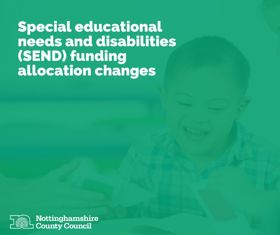
Nottinghamshire County Council is set to change the allocation of special educational needs and disabilities (SEND) top up funding to families of mainstream schools. This decision, part of the wider Nottinghamshire SEND Improvement Plan, aims to provide a fairer and more responsive system to support inclusive practice for children with SEND in mainstream schools.
The council is committed to supporting its mainstream schools in providing for the needs of all children with SEND. Over the past five years, the high needs funding budget the council has devolved to mainstream schools has increased by 70 per cent, with a commitment to a further increase again this financial year.
In Nottinghamshire, the number of (EHC) plans maintained by the local authority has more than doubled over the past seven years, placing significant pressure on services and provisions for children and young people.
As part of the council’s ‘graduated response’, schools can access additional high needs top-up funding to support children with SEND, without the need for an Education, Health and Care (EHC) plan, which is different from many other local areas nationally. This means that children with SEND do not have to wait for an EHC plan to access additional support, they can have their needs assessed and additional support including funding put in place through their local family of schools. This local partnership approach can help provide young people the right support at the right time.
To ensure the council is using funding effectively to make the greatest difference for children and young people, a new way of allocating funding to groups of schools (called families of schools in Nottinghamshire) is planned. It aims to better support families of schools that include high numbers of children with SEND from outside of their immediate catchment area.
The allocation of Additional Family Needs (AFN) funding to mainstream schools is set to change, ensuring that funding is allocated more fairly among schools to support the inclusion of children with SEND.
Councillor Sam Smith, Cabinet Member for Education and SEND, said “The council is committed to improving the outcomes of children with additional needs. Developing a funding allocation system that is both fair and responsive will support the vital role of schools in the education and inclusion of children with SEND.
“For funding to take into account the actual number of children and young people with SEND that schools are supporting means that funding will reach those schools and pupils who most need it.”
The council recognises the importance of mainstream education settings for children and young people with SEND, as stated in the Children and Families Act 2014 and the SEND and alternative provision improvement plan.
All schools receive core funding to help them meet needs of children with SEND, including basic rate per pupil. If a school needs more to meet needs, they can also apply for top-up funding. In Nottinghamshire, the county council devolves some of its top up high needs funding to families of schools to provide support without the need for an EHCP, meaning that schools can identify and meet needs early.
The new funding process aligns with the statutory duty of schools to make reasonable adjustments for children with additional needs.
The council is working with a small number of schools to pilot the new funding approach and family SENCOs who have been trialling the SEND funding tracker tool have told us that:
“Our inclusive schools will be able to provide more funding for children with SEND, in line with expectations across the county. The funding will more closely match the pupils in the school and support the inclusivity of that school. Ultimately, this will help to improve outcomes for our children with SEND.”
These changes are expected to be implemented from April 2025.
Alongside this funding change, the council has recently implemented a new SEND bridging fund to support children with SEND when transitioning from a nursery setting into a mainstream school from September 2024. Being automatically allocated to any individual child who already receives SEND inclusion funding in a nursery setting, it means that schools do not have to make brand new requests for additional funding for these children and can instead focus on developing effective transition plans and meet the child’s needs as early as possible.
These changes are part of the council’s work to improve outcomes for children with SEND and to making local SEND processes clearer and easier for schools, parents and carers to navigate.
